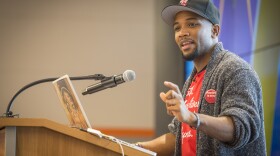The linguistic rules of African American Vernacular English (AAVE) are widespread and catalogued — yet most classrooms still frown upon writing and speaking it. Hip-hop scholar Kyesha Jennings grew up in Queens, New York, and remembers teachers correcting her use of the possessive they and double negatives. Now, she’s on a mission to disrupt the common belief that all English follows one set of rules.
Going to an HBCU was an important step in affirming and examining her own use of language. Jennings built a close relationship with a professor of hip-hop, and she began to consider the ways in which music and popular culture could combat the idea that Black people’s English is broken. She turned to scholarship after student-teaching in a mostly-white local school, where she pushed up against the institutional anti-Blackness in K-12 curricula. The experience left her with an itch to demonstrate the intricacies of AAVE.

As a scholar writing in academic jargon, Jennings lays out the ways Megan Thee Stallion validates pleasure politics and practices new forms of digital feminism through her lyrical acrobatics. She writes for scholarly journals and local newspapers, teaches English and gives radio interviews.
People have forgotten the legacy of Black women musicians.
In defending AAVE to multiple audiences in their own vernacular, she proves her point — no language is better or more proper than the other, and complex ideas can be expressed using any dialect.
Host Anita Rao hears Kyesha Jennings’ story of flipping stigma into celebration. A regular writer for INDY Week, her recurring column is “Her Take: On Carolina Hip Hop.” Jennings is an English lecturer and faculty mentor at North Carolina State University, and she is a Ph.D. candidate at the Indiana University of Pennsylvania studying English literature and criticism.

INTERVIEW HIGHLIGHTS:
On exploring diverse Black culture at an HBCU:
That culture shock then became fascinating, because we got to be introduced to other regional cultures, such as Baltimore club music and Philly’s culture, their vernacular, their slang. And we would constantly compare the way that somebody in Philly would say something and the way that we would say something in New York. The way that they dressed was different. The music they listened to — the type of dances were different. So this is, what, 2006 in New York? In 2006, we were doing the chicken noodle soup, a lot of, like, Harlem-originated dances. And then in Philly, they were still doing a dance called Wu Tang. And so, it became fascinating to see, you know, all these different, diverse ways of Black culture and engaging with different forms of creativity and music. That was my first time hearing Go-go music
On her mixed-methods approach to hip-hop scholarship:
I see myself as a storyteller or an advocator for folks. … Whether it's writing for the Indy, whether it's writing an academic article, or teaching a course, or curating an event, I find that I am attempting to not only tell stories but protect and advocate for folks. So advocate for Black women and girls. Advocate for Black writers, advocates, visual artists, and also advocate for independent, local hip-hop artists.
I had an amazing relationship with both of my parents, even through the incarceration.
On Black feminism in her family:
I never had to navigate low self-esteem, because I never saw the women in my life have low self-esteem. Unfortunately, a lot of times, women are conditioned to stay in bad marriages or bad relationships. Whatever the reason — financial stability, security for the kids, or maybe because they have low self esteem ... I see this in some of my friends’ families or parents, but not the women in my family. They have been divorced, and they've found love again. They have shown that you can have happiness with or without a partner.

And I have just witnessed them put themselves first — put their pleasure first. I’ve also witnessed them maintain friendships with other women. And that's another part of Black feminism, like the communal aspect, that's important. To witness my mom and my aunts and the extended women in our family be able to maintain and cultivate friendships with other women for 20 plus years, those things are all important when it comes to raising girls.










